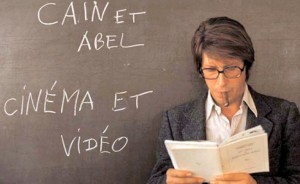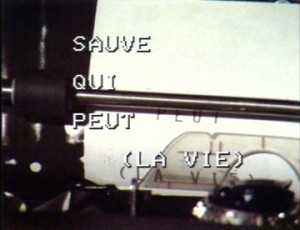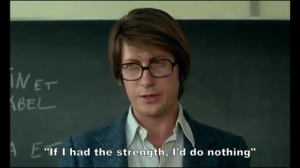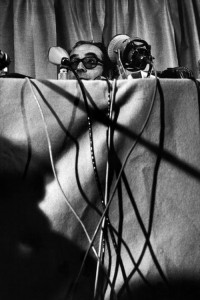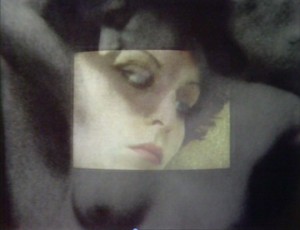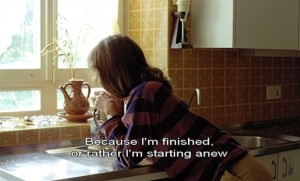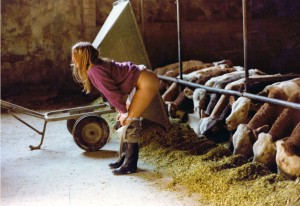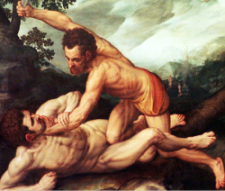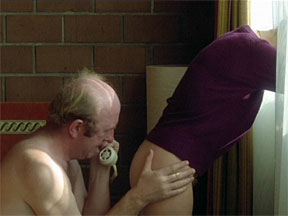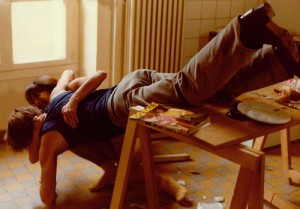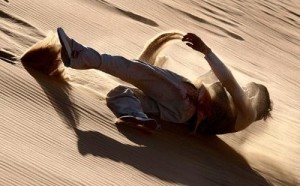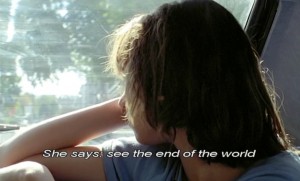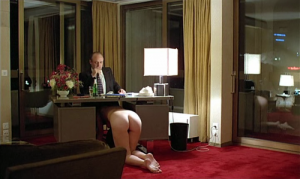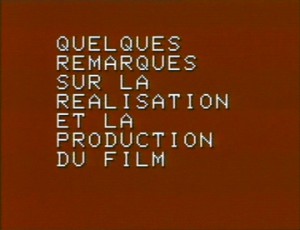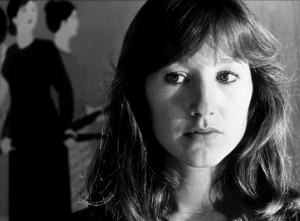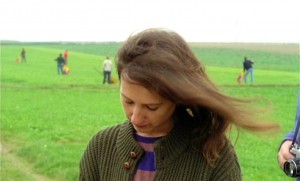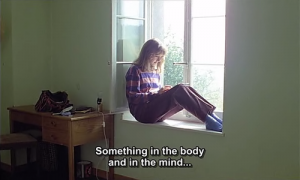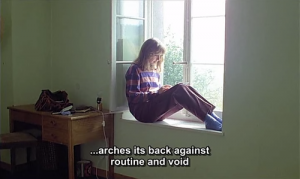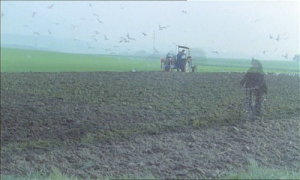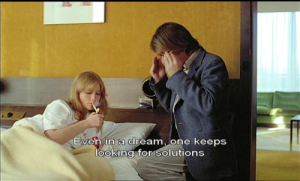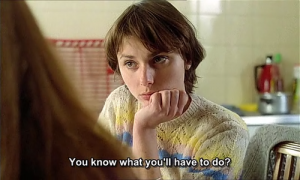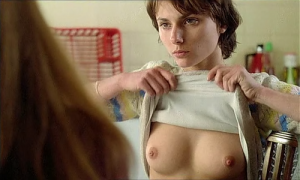I’d like to begin by talking about the ‘f’ word, it’s a term that will very shortly fall out of use, in polite company and impolite, but I’d like to raise it here, at least at the beginning, I’d like to talk about film.
Twenty one years ago I set off in search of film, and it soon became an obsession. Like all obsessions I had to work at it, the way you feed plants or go to the gym, it’s something that you water and grow up with. These days when people talk about wanting to get into film they associate it with a scene which happens very rarely in real life, but which is repeated in film after film. It has to do with the clap, which is a very contemporary problem for anyone who dares to embrace film. You allow film to enter you, you open yourself to it, and then you get the clap, or at least that’s how the fantasy goes. In the movies, this scene is played out in restaurants, or high school reunions, or workplaces, or on the street, or just about anywhere really where crowds might gather. The hero is always male, no one really understands him except his trusty .357 magnum, and he doesn’t fit in to things as they are. He’s just like all those other people that don’t fit in but he can’t know that, and his inability to control everything he sees instantly is metabolized by the film and spit out as a series of encounters which are dangerous and difficult. In the end, when our hero emerges, when he has jumped, kicked, crawled, blown away, shot at, dynamited, garroted, buried, sliced, carved, diced, minced, hacked everything in his path that looks like love, when the tail light of the last obstacle is already behind him, everyone around him stands up, as if bidden by some higher power, and begins to clap. This applause, it seems to me, is at the very heart of what cinema is today.
Naturally it was different when I was young. Then there was a kind of Eden of cinema, a perfect cinema, that none of you will ever know and which I can’t remember. Like you, like all of you, I suffer from insomnia. I crave the dark not in order to go to sleep, but to see pictures. I find these pictures help me forget, no, more than that, they insist I forget, as one image replaces another onscreen, on the screen of my imagination, it erases everything which has gone before. It does more than help me forget, film demonstrates the act of forgetting itself. I believe that the cinema is a history of forgetting, which is undertaken collectively, with groups of people sitting in the dark, in the darkness of our own lives, and for taking up this task, this necessary ordeal of forgetting, as a filmmaker I crave only applause. I want the clap.
Part Two
This is part two and it’s called The Slut of the Normandy Coast. Lacking any means of my own, I thought I would go on by reading you a story, it’s a story about storytelling, a story about writing, by my very favourite writer, Marguerite Duras. She’s been asked to adapt one of her novels, The Malady of Death, for the stage, and it’s not happening, she tries over and over again, but it doesn’t work.
In these words which I’m about to read you, lie the secret of creation. I’ve often imagined future generations, crippled by amnesia and computer chips, entering a library, any library, with something like those forked dowsing sticks, you know they use them still in Texas to look for water. You hold them out in front of you like a lawnmower. If you’re a real dowser, then they’ll twitch, they’ll shake a bit, like a ouiji board, and that’s where you dig the well. So I imagine folks all got up in the future with something like one of these sticks and they enter a library waiting for that twitch, looking for a way back, because in the future memory will be a natural resource that will be much more scarce than gold or oil, and the Swiss will have rejigged their banking system and removed themselves from the gold standard and put themselves on a memory standard, and somehow they will have found a way to hoard memory, so that no one else will have it. Then this little group of people, who maybe runs a festival of small avant-garde activities, takes this dowsing stick into a library, into the only library that’s still around. It starts twitching like mad over one particular book, and they pull it out and it’s called The Slut of the Normandy Coast by Marguerite Duras. Only they don’t know how to read it, they’ve forgotten how, so one of them sticks it into their bio-port, and then they begin to say the words, the words to this precious, long forgotten, never read any more book. And it goes like this…
At this point I was going to attempt to summarize the book, this book by Duras, The Slut of the Normandy Coast, but as I read it again today, only hours before coming here, I realized that any passage I might read to you from this book could only lead to misunderstanding or worse.
And so I have to leave this book, these passages, out of my talk, though you should know that nothing I’m about to say, and nothing I’ve already said, will really make any sense without it. Let’s move on to part three.
Part Three
Film is like drawing, it’s a light in the darkness, it’s a pencil stroke on a blank page. In film there is always the abyss, the nothingness, and of course the patron saint of nothing, who is Nietzsche, who wrote: when you look into the abyss, the abyss also looks into you.
Video is completely different. Video exists everywhere. Signals which are producing video are passing through us right now. So if film is like writing, then video is like sculpture. You have this mass in front of you, this block of stone, or hunk of wood, and it’s too much, there’s too much there, and from that block you begin to take away, you erase. That’s how you make video, by erasing.
I used to make film, and now I make videos. I found film very difficult. It’s awfully heavy for one thing, heavy cameras, heavy lights, filmmakers are people who have a lot of pockets and who carry bags which are always a little too full, and as they get older they walk with a little stoop because they’re bent down underneath the heaviness of this wanting, this film. The reason it’s so heavy I think is because the image is so big. The picture itself starts very small, it’s a small world, and it’s very expensive, so you can’t make very many pictures, you just make a few, and then they get blown up very very large, and making the big picture demands a toll on its maker, who is a kind of aperture, who becomes the place where all this light passes through. In order to big up the light, you have to bend down under it and lift it up, and that makes you tired. Video’s not like that at all. Video is light and easy. The reason it’s so light is because it’s not going to last, and everyone knows this. Video is for right now, and then it’s gone, it’s over. There is nothing essential about video, not like film, video is 1/2″ b/w portapack, or U-matic, or high-8, DV, high-def or a hundred other things. Video is like that creature that traps Odysseus whose just trying to find his way home. Finally Odysseus grabs this guy by the throat and right in front of him this guy’s face changes a thousand times, he turns into a lot of other people, one after another, and then dies. That guy is like video. He knows he’s going to die, and he knows somehow that that’s okay.
Video is a donut shop on the freeway, a gas station, a list of groceries. Film is the thing itself, let’s be blunt here, it’s about fucking. It’s about penetration, and being penetrated. It’s about suffering and joy, it’s about high high and low lows. Film is about eternity, about making it last, and larger than life heroes. One of Woody Allen’s amours turns to him and makes this accusation, which is also a kind of definition of film: “You use sex to express every emotion but love.” That’s what film is, a flickering intercourse between human and machine. Video on the other hand is just foreplay, it’s just setting the table, setting the stage, for what’s to going to come after, which is the real deal, which is the future, impossible for any of us to really imagine. It seems pretty obvious that we’re in the midst of a big time change right now, between a written culture and something else, a digital culture maybe. This culture isn’t the difference between going out on a Saturday night and bowling with your friends or going to see a movie, not at all, it’s the difference in what it means to be human. I think in the future people will live completely on the surface, there will be no more inside, you really will be able to judge a book by its cover, there will no unconscious, no dark continent of the soul, and no secrets. We will be transparent to one another, and this will change everything: what we think of as our family, our sex, our tiny, protected lives. Film is the last stand, the last place the old world can make itself felt, and still make sense. But video is the scrub room for the new world, the new people that our children or someone’s children, or someone’s children’s children, will become. And in this they won’t have a choice, because no matter what we do, we are all condemned to the future.
Originally published in: Arts Atlantic Magazine (Fall 2001)
The Slut of the Normandy Coast by Marguerite Duras
…Luc Bondy had asked me to direct La Maladie de la mort (The Malady of Death) at the Schaubuhne in Berlin. I had accepted, but I had told him that first I’d have to adapt it for the stage, that I’d have to make a selection of the text, that it could be read but not acted. I made the adaptation. In it, the protagonists were silent, and the actors were the ones who told their story, what they had said, what had happened to them. All the scenes, all ten or twelve of them, were finished. They were to be read, as well as the text of the dialogue between the main characters. The woman had not been called upon in this adaptation, she had been set aside. It was about the man, not the woman. Two days after having sent this stage adaptation of La Maladie de la mort to Berlin, I phoned to ask them to send it back because I no longer wanted to do it. I told Yann. I often tell him what I’m doing. As soon as I had been dispossessed of the manuscript, I realized I had made a mistake. I had done exactly what I had tried to avoid. I had gone back to La Maladie de la mort, to its very principle of a text for three voices, to its stilted and unitary form. I had been emptied out, I had become the opposite of a writer. I was the plaything of a formal fate from which I was trying unsuccessfully to escape. I spoke of this to Yann. He didn’t believe me. He had often seen me stalled in my projects, come to a halt, then begin again. Three times I started on the Berlin adaptation, the third time with a typist and a schedule. That time I dictated what I imagined to be the perfect version, but in fact it was the worst of all, pompous and artificial. Three times I tried. I would begin with La Maladie de la mort and I would come back to it. While I was working I had no idea where I was going. I’d find myself back there, each time back to the same place in the book, huddled against it, dazed. I could no longer trust myself, I was lost. To make matters worse, it was always at the stage of typing out the final draft that I would become aware of the results. Whatever I did it seemed that I had always to resort to a false solution. Once again I spoke to Yann. I told him it was over. I was fed up with wasting time, I was giving up the idea of adapting the text. Shortly afterwards I began a book that was to be called The Perjured Man, but was also abandoned. And then, one day, the weather was warm, in the evening, at night. It was midsummer, in June. I began writing about the summer, about the hot evenings. I didn’t know exactly why, but I carried on. It is then that Yann enters a period of crying out loud, of shouting. He types out the book, two hours a day. In the book, I’m eighteen, I’m in love with a man who loathes my desire, my body. Yann types as I dictate. While he types, he doesn’t shout. That happens afterwards.
He shouts at me, he becomes a man demanding something, who doesn’t know what that something is. So he shouts, to say that he doesn’t know what he wants. And he also shouts to find out, so that, from the current of words, the knowledge of what he wants might appear on its own. He can’t separate the detail of what he wants this summer from the whole of what he has always wanted. I hardly ever see him, this man, Yann. He’s hardly ever there, in our apartment by the sea. He goes for walks. During the day he covers different distances, each several times. He goes from hill to hill. He visits the large hotels, he seeks out beautiful men. He meets several handsome bartenders. At night he goes to The Melody. In the afternoon to Normandy. When he comes back, he screams, he shouts at me, and I carry on writing. Even if I say, “Hello’, “How are you?” “Have you had dinner?” “Are you tired?” he shouts.
At first it was difficult, I thought it was unfair, his shouting at me. That it wasn’t right. And when I wrote and saw him coming and knew that he was going to shout, I could no longer write, or rather the writing stopped everywhere. There was nothing left to write, and I would write sentences, words, scribbles, to make believe that I didn’t hear the shouting. I spent weeks with a jumble of different writings. Today I believe that those that seemed to me then the most incoherent were, in fact, the most decisive in the book to come. But of this I knew nothing. I wouldn’t ell him that I couldn’t write because of his shouting, and because of what I thought was his unfairness towards me. Soon, even when he wasn’t there, I was incapable of writing. I waited for his shouts, his screams, but I continued to fill the page with sentences that were alien to the book that was there, in the process of being made, in a field foreign to it, in fiction.
At last a sense of order was established, one for which I was not responsible, I who worked the writing onto the page, but for which Yann was responsible, he alone, and without putting pen to paper, without having to do anything about it, without any other intention that of slaughtering, down to its very roots, anything that might be seen as an encouragement to live on. Of himself and of his anger he knew as little as an animal does, that is to say, nothing, not even that he shouted. That is how, a month before the date agreed upon for the delivery of the manuscript, I began the definitive book, that is to say, I began to find that man, Yann, not where he really was, but by seeking him in things that were alien to both him and the book-for instance, in the landscapes of the Seine estuary. Very much there. And in himself as well, in his smile, Yann’s smile, in his walk, his hands, Yann’s hands.
I separated him completely from his words, as if he had caught them unwittingly, and they had made him ill. And that was how I found out that he was right. That he was right to want something with such intensity, whatever it might be. However terrible it might be. Sometimes I would imagine that the time had come, that I was going to die. Four years ago I underwent a treatment that left me weak; since then I tend to believe that death is there, within reach of my life. He wanted everything at once, he wanted to destroy the book and he feared for the book’s survival. For weeks he had typed two hours a day for me. Drafts, different stages of the book. He knew that the book was already in existence. He would say, “What the fuck are you doing writing all the time all day long? You’ve been abandoned by everyone. You’re crazy, you’re the slut of the Normandy coast, a fool, you’re embarrassing.” After that, sometimes we’d laugh. He was afraid I’d die before the book was completed, maybe, or rather, that I’d throw the book away, once again.
I no longer thought about Quilleboeuf, but I still felt the need to go there. I would go there with friends, but I didn’t know why that alien place meant so much to me; I thought it was because of the large river that ran past the square where a cafe stood. I thought that it was because of the sky of Siam, here yellow with petrol fumes, while Siam itself was dead.
Sometimes he would return at five in the morning, happy. I began not to ask him any more questions, not to speak to him, to say good morning just for the pleasure of doing so. Then he became louder, he became terrible, and at times I was afraid, and believed that he was more and more in the right, but I could no longer stop the book, any more than he could stop the violence. I’m not certain against what Yann was shouting. I think it was against the book itself, real or imagined, beyond all definition, pretext, excuse, etc. It was simply that: making a book. It went beyond what was reasonable in its reasons, and hat was unreasonable in those same reasons. It was like a goal: kill it. I knew that. I knew more and more things about Yann. In the end, it was like a race. Run faster than him in order to finish the book, so that he would not stop it completely. I lived with this throughout the summer. I also must have expected it. I would complain to people, but not about the essentials, not about what I am writing now. Because I thought that they would not be able to understand. Because there had been nothing in my entire life as illicit as our story, Yann’s and mine. It was a story that meant nothing outside our space, the space where we stood.
It’s impossible to speak of how Yann spent his time, his summer—it’s impossible. He had become unreadable, unpredictable. One could say that he had become fathomless. He went in all directions, to all those hotels, to search beyond the beautiful men, the bartenders, the husky bartenders of foreign lands, of Argentina or Cuba. He spun in all directions. Yann. All directions met in him at the end of the day, at night. They met in the mad hope that a scandal might occur, an absolutely commonplace scandal centered around my own life. In the end, it began to be readable. We had reached a place where life was not totally absent. Sometimes we received signals from it. It, life, strolled along the seaside. Sometimes it crossed through town, in the cars of the Morality Squad. There were also tides, and then Quilleboeuf, of which one became aware, in the distance, as ever-present as Yann.
When I wrote La Maladie de la mort, I did not know how to write about Yann. That I know. Here, the reader will say, “What’s got into her? Nothing happened, since nothing takes place.” When in fact what took place is what happened. And, when nothing else takes place, then the story is truly beyond the reach of both the writer and the reader.
Published in “Two by Duras” by Marguerite Duras, translated by Alberto Manguel, Toronto: Coach House Press, 1993
